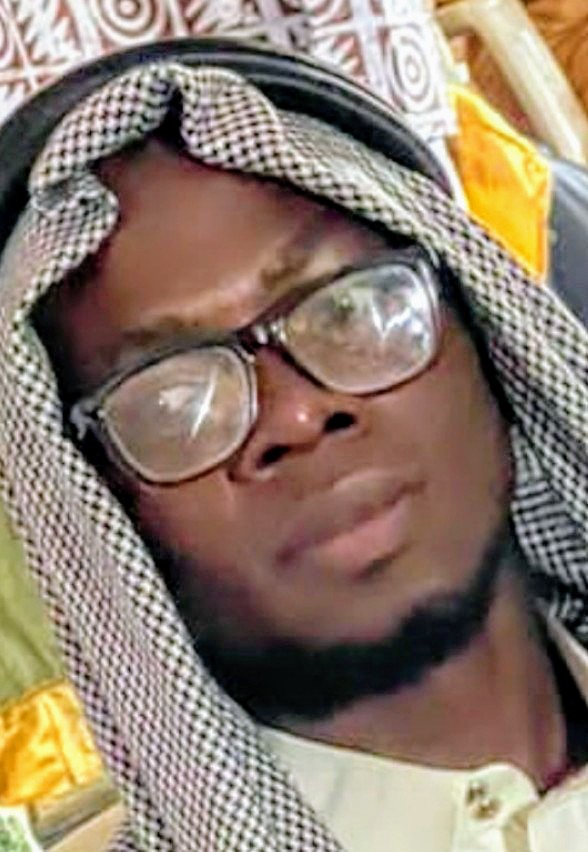From taking a 6-month intensive taafidh programme at Al-Qurraa Schools, Ibadan, where he memorised 22 ajzaa of the Qur’an, Abdussobur later committed the entire Noble Qur’an to heart, teaching himself

• Completes memorisation of the Noble Qur’an at 19
• Earns certification in 10 Qira’aat
• Says plan is to get PhD in Islamic Sciences abroad
A young Nigerian scholar, Abdussobur Ismail has mastered the narrations of the Noble Qur’an and holds certification in the 10 Qira’aat (variants of the Qur’an) from Ma’adu-z-Zakariyyah in Ibadan, Oyo State.
From taking a 6-month intensive taafidh programme at Al-Qurraa Schools, Ibadan, where he memorised 22 ajzaa of the Qur’an, Abdussobur later committed the entire Noble Qur’an to heart, teaching himself.
Muslim News gathered that Abdussobur attained this incredible feat at the age of 19.
Born in Lagos State, Nigeria, he attended the popular Vanguards Academy in Ijebu-Ode, Ogun State and completed his secondary education in 2016.
The journey to his accomplishments with the Qur’an will not be complete if the story of how he paused his undergraduate programme in Civil Engineering at the choice University of Lagos (UNILAG) is left untold.
Abdussobur said he later found Islamic Sciences interesting after discovering its values and gains.
In the same vein, he enrolled in a B.A Islamic Studies programme at the International Open University (IOU) late 2020, combining it with UNILAG’s Civil Engineering before finally taking the decision to abandon the latter.
haafidh Abdussobur
“I gained admission into UNILAG to study Civil Engineering in 2017, even though we resumed in 2018. UNILAG came with peculiar challenges but I guess the COVID-19 period was the turning point for me as I realised that engineering wasn’t exactly what I wanted to pursue and I found a professional pathway in Islamic Sciences.
“Actually, from secondary school, I loved certain subjects like Mathematics, Physics, Islamic Studies, Qur’an and Arabic, but I never saw the Islamic subjects as anything that could be professional and that explains my sojourn into Engineering.
“That changed in 2020, when I realised that there was actually a pathway in the pursuit of Islamic knowledge. Not surprisingly, I was very comfortable with that. I started a B.A Degree in Islamic Studies at the International Open University (IOU) late 2020 with the plan of holding a Doctorate in one of the Islamic sciences by 2030 (that’s like a 10-year plan). Then, I was combining double degrees (Islamic Studies & Engineering),” he said.
When he completed his secondary education at Vanguards, Abdussobur did not immediately join UNILAG due to age limit.
He, however, gained admission the following year. It was during this one-year wait that he enrolled in the 6-month taafidh programme at Al-Qurraa Schools Ibadan, where he memorised 22 ajzaa of the Qur’an.
Abdussobur tells the story better: “During that year, I enrolled for a 6-month intensive taafidh programme at Al-Qurraa Schools, Ibadan. The programme is designed for students to complete their Hifz in 6 months, but I was also preparing for UTME then, and I was young. So, I was not all that serious. At the end of the programme, I had memorized 22 Ajzaa. I eventually completed it through self effort around 2019.”
The young haafidh finally let go of his Civil Engineering programme at UNILAG.
According to him, the decision was taken during the ASUU strike in 2022 that lasted 9 months.
“Throughout these months, I was not doing anything Engineering-like. I was more focused on Qur’an majorly. We even organised two Qur’an Bootcamps in that period; an innovative idea that came from myself and Muhammad Ahmad (Mayad),” he said.
“Along the line during the strike, I saw a friend’s report sheet of Ma’adu-z-Zakariyyah in Ibadan and the courses that were there were similar to the courses taken in universities at Bachelor’s level for Qur’an Sciences. Even though I’ve heard of Ma’adu-z-Zakariyyah during my secondary school days in Vanguards (because a number of our teachers attended the school), it never occured to me to enroll but the programme run by the centre endeared me and I made up my mind to enroll.
“But in all of these, only one thing was not fitting in the plan, and that was UNILAG. So I decided, one thing (of my plans) will definitely have to go, and the decision was made. September 2022, I left Lagos and everything in it (including UNILAG) en-route Ibadan.”
Abdussobur says life in Ibadan wasn’t rosy. Coming from a bustling and modern city of Ikeja where he was born and raised, he found Ibadan quite strange.
“Nothing prepared me for the ‘shege’ I saw there. But Alhamdulillah all the way,” he said.
Abdussobur recalled how the founder of the madrasah, Shaykh Abbas Zakariyyah established Ma’adu-z-Zakariyyah in 1993 with the aim of teaching Qur’an and Tajweed.
With Shaykh Abbas Zakariyyah
According to him, “Around 1980s, there was a programme in Kano organized to teach people the Qur’an with its pure Tajweed and Qira’aat. Shaykh Abbas Zakariyyah (we call him ‘Baba’) was one of the 71 persons that benefitted from that programme; the only Yoruba amongst them. In 1993, he returned to Ibadan and started Ma’adu-z-Zakariyyah, where he taught his students the Qur’an and Tajweed. It was a two-year programme.
“When they had completed the Hifz and Tajweed, he started teaching them the Qira’aat too for another 2 years. Like that, he began a curriculum – When you come to Ma’adu-z-Zakariyyah, you spend the first 2 years to memorize the Qur’an, and learn Tajweed, and the next 2 years to start learning the Qira’aat, and other Qur’anic sciences.”
At Ma’adu-z-Zakariyyah in Ibadan, Abdussobur was taught the knowledge of Riwaayah and Qira’aat. He didn’t have a deep knowledge of these aspects of the Qur’an sciences even after memorising the entire Holy Book.
“Then, I didn’t know anything about Riwaayaat or Qira’aat. I only did a crash course in Warsh from Ustadh Toyyib Mustapha at Mumtiah Madrasah. By the time I got to Ma’adu-z-Zakariyyah in Ibadan, I saw a different light entirely,” he noted.
“There is an Hadith of the Prophet (SAW) that was narrated by Umar where he saw Hisham bn Hakim bn Hizaam reciting the Qur’an in a different way from what he was taught by the Prophet. When they met the Prophet, he (SAW) confirmed the recitation of the two of them and made the popular statement; “Allah has revealed the Qur’an in seven Ahruf, so read from whichever is convenient for you”. I won’t be directly translating the term ‘Ahruf’, because its scope is wide.
“From those seven Ahruf, various recitations have stemmed, and the scholar, Ibn Al-Jazari came up with conditions for accepting a variant recitation. That tailored it to 10 Qira’aat (variant recitations) and every Qira’ah has 2 Riwaayah (narrations or transmissions). That’s 20 acceptable variant narrations of the Qur’an. We popularly know just 1, and that is the Hafs Narration from Imam Aasim.
“When you come to Ma’adu-z-Zakariyyah, you spend the first 2 years to memorize the Qur’an, and learn Tajweed, and the next 2 years to start learning the Qira’aat, and other Qur’anic sciences. When I got to the Madrasah, I had already memorized the Qur’an so it was quite easy. I started from year 3, but I had to combine the lessons of the first 2 years. So, I did Class 1-3 in just 1 year. I eventually completed the 4th year with my mates.
“First year, I was still coping with Ibadan and I was very engaged, so I didn’t do much. The second year, I was quite free, so I decided to start living with my Ustadh who is Baba’s first son, Ustadh AbdulBasit Abbas Zakariyyah. I had already planned to have a certification (Ijaazah) in these Qira’aat, and to do that, you have to sit with a Shaykh and recite the Qur’an from the beginning to the end to him, while being tested on the variants of other narrations.
“It wasn’t easy at all, as I was doing this alone and I had to self-motivate myself. I would often read to Ustadh till late in the midnight (sometimes around 1 a.m). Ustadh made it easy for me. We had very flexible schedules, and I’d even recite online sometimes.
“Alhamdulillah, by the time I was ending Ma’adu-z-Zakariyyah, I had what my peers didn’t, the knowledge of almost every narration. I had mastered up to 15. Eventually, I completed it (just before our graduation). One of the factors that helped me the most was my Halqah; Halqatul Hikmah, where we would learn these sciences and practice them together. We do Halqah monthly in Mushin, Lagos.”
Scholar Abdussobur (l)
Abdussobur graduated as the best student of his class and earned certification in the 10 Qira’aat.
He was also able to complete his B.A Islamic Studies programme at IOU, awaiting convocation in January 2025.
Abdussobur says his plan is to further in his education to obtain a Doctorate.
“My next plan? I guess it’s always unto Allah’s hands, but I think I’ve gotten my niche in Qur’anic sciences. I’d like to further my studies in it. Maybe with the hope that one day, I could be a PhD holder in ‘Uloom-ul-Qur’an. Like always, I hope to do that somewhere outside Nigeria, Bi idhni llah.”
He currently runs an online course on Advanced Tajweed, with a plan to launch another on the Fundamentals of Qira’aat sooner.
Abdussobur also holds a monthly halqah in Mushin Lagos State, which he started in July 2023.
According to him, some of his students are now being certified in Tajweed and Riwayaat.
Abdussobur told Muslim News that the hardest part of being an haafidh is the ability to retain the portions that had been memorised.
He said what made it easier for him was that he actively taught people, aiding his retentive ability.
“What makes it a bit easier for me is that I am actively in the process. I constantly teach people, and I am always in the environment. From 2020, I was already taking charge of UNILAG taafidh and we started a Qur’an club. It helped me a lot in my Muraja’a too,” he added
Curled from Muslim News









